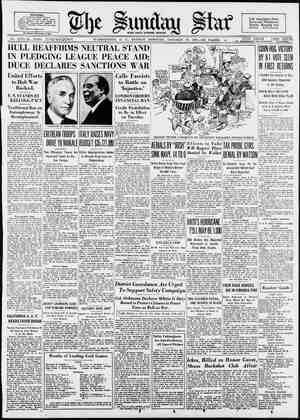Evening Star Newspaper, October 27, 1935, Page 85
You have reached the hourly page view limit. Unlock higher limit to our entire archive!
Subscribers enjoy higher page view limit, downloads, and exclusive features.
L NN ’ "Magazine Section Illustrations by Marshall Frantz solicitor in Lincoln’s Inn. Their ex- pressions and general attitude were sufficiently disturbed to suggest that their gathering was of no ordinary moment. A grey-haired, untidy-looking woman in seedy black was tapping the mahogany table in front of her with long, ill-cared for nails, and breathing quickly. A fat, red-cheeked man with a waistcoat, the lower buttons of which failed *o connect, with blue watery eyes and a loose but good-humored mouth was whis- tling softly to himself. A pleasant-faced but shabbily dressed young man was leaning back in his chair with his /hands in his pockets and a palpably as- surhed air of indifference. Next to him, a girl of fagreeable, almost striking appearance, with at{tractive, light brown hair, thoughtful eyes, t/he blunt finger tips of a typist and the rather wan complexion of the underfed city toiler, was seated a little grimly in her chair, with eyes which seldom moved from the door. Every now and then her lips twitched under the strain. Next to her was an older man, better dressed than his companions, with deeply lined face and weary expression, He had somehow the air of a man facing a crisis, but he had also the air of one prepared to receive the good or the evil of life with resignation. A tentative conversation had petered out. The little company either watched the sway- IVE people wereseated around a table I ; in the private office of a well-known * THIS WEEK [.egacy of Adventure A new series of absorbing stories on the curious happenings to the five Rooke legatees, ing of the boughs of the lime trees outside the window or concentrated their attention upon the door. “I'm fed up with this,” the stout man de- clared, mopping his forehead with a handker- chief of dubious appearance. “Why don’t the - bloke come?"’ “We have been here only about ten min- utes,” the younger man reminded him. “It seems an hour,” the woman with the grey untidy hair moaned. ‘It seems a whole day — it seems a lifetime!” “And all over a matter, I daresay, of a paltry fifty quid,” the gan with the weary expression muttered. “Fifty quid would do me a bit of good,”” his neighbor sighed. Then their suspense was suddenly ended. The heavy mahogany door was pushed in- wards. A tall, exceedingly good-looking elderly gentleman, followed by an obvious clerk, en- tered the room. The former bowed stiffty to the little company who greeted him almost in silence. He made his way towards a vacant chair and took a sheet of paper from his secretary’s hand. ‘‘Let me introduce myself,’’ he began curtly. “I am Sir George Eastman, head of the firm of Eastman & Pelligrew. You, I gather, are the legatees under the will of my late client, Mr. Desmond Rooke.” “That sounds all right so far, Sir George,” the stout man said, once more mopping his forehead. ‘“What we are anxious to know is — by the master story teller E. PHILLIPS OPPENHEIM When they heard why they had been called together, they were completely overcome artner The first meeting of the legatees and the introduction of the Watson Murder (ase what are we legatees of? Scarcely ever heard of the old boy myself.” “We shall come to that,” Sir George an- nounced. “I have here a list of your names. The first name upon the list is Miss Ann Rooke.” The girl leaned forward. “That is my name, sir,” shesaid in a low but quite pleasant voice. Sir George consulted his paper once more. “You are twenty-two years old, an orphan, employed as typist by a firm of provision mer- chants in Thames Street?” “That is correct, sir."” “Then I have here Mrs. John Rooke, widow of John Rooke, builder, of Tottenham, aged fifty-two.” S The woman with the long finger nails paused ineher nervous movements. ‘“My name,” she admitted huskily. “John Rooke was my husband.” The solicitor passed on. ‘“‘The next name on my list,” he continued, “is Philtp Rooke, aged forty-eight, of no occupation.” The stout man nodded gloomily. “I've been everything from ap auctioneer to a scene shifter,” he confided. “Nothing doing at present. I'm touching the dole,” he added with a semi-defiant glance around. “Got as much right to it as anyone after all. Paid my taxes ‘when I was better off.” ' “The next,” Sir George went on, stud: the list through his horn-rimmed eyeglass, “js Mr. Colin Rooke, aged twenty-five, journalist.” The young man held up his hand. *‘Rather- a vagabond sort of journalist, I'm afraid sir,” he said with a faint smile. “But I scrape along somehow.” “The last name on my list,” the lawyer concluded, “is Mr. Percy Rooke, insurance agent.” ““That is my name, sir,” the better dressed man assented a little wearily. Sir George Eastman leaned back in hit chair, laid the paper before him and pressed his finger tips together. } “After the most exhaustive enquiries,” he said, "'l have been able to satisfy myself and, what is more important, the Court that you five are the only possible relatives of the
